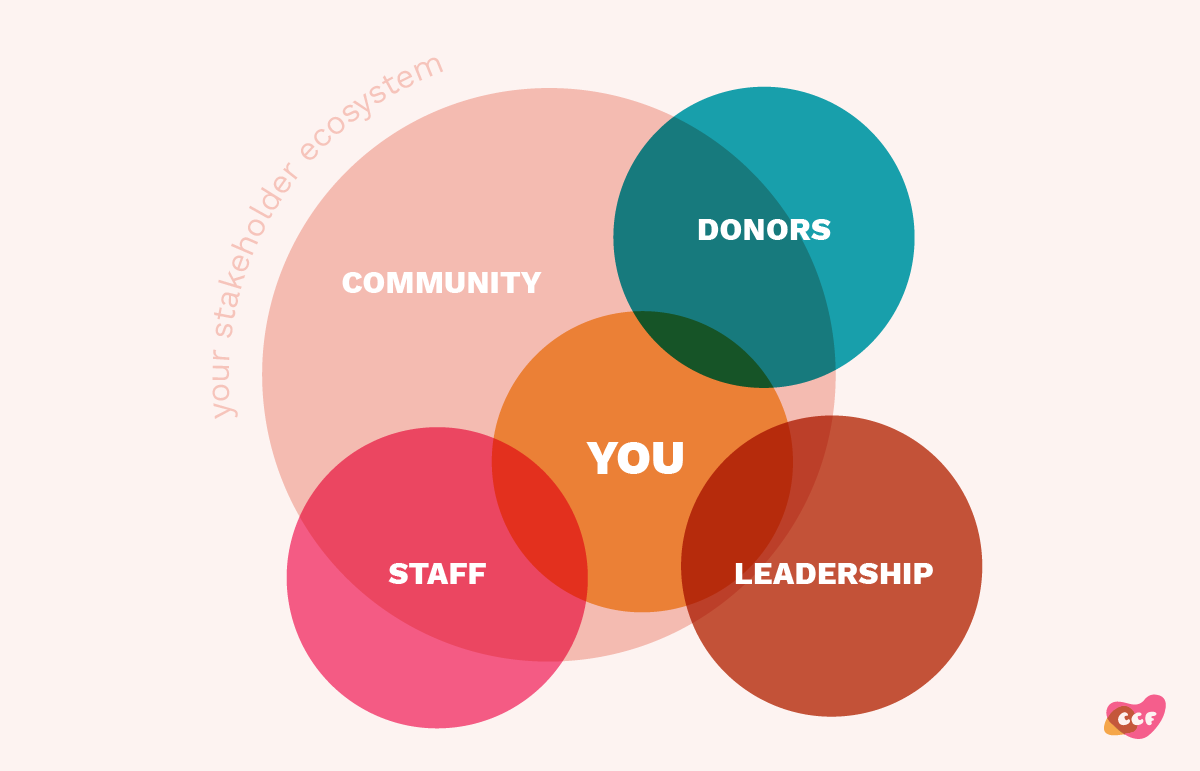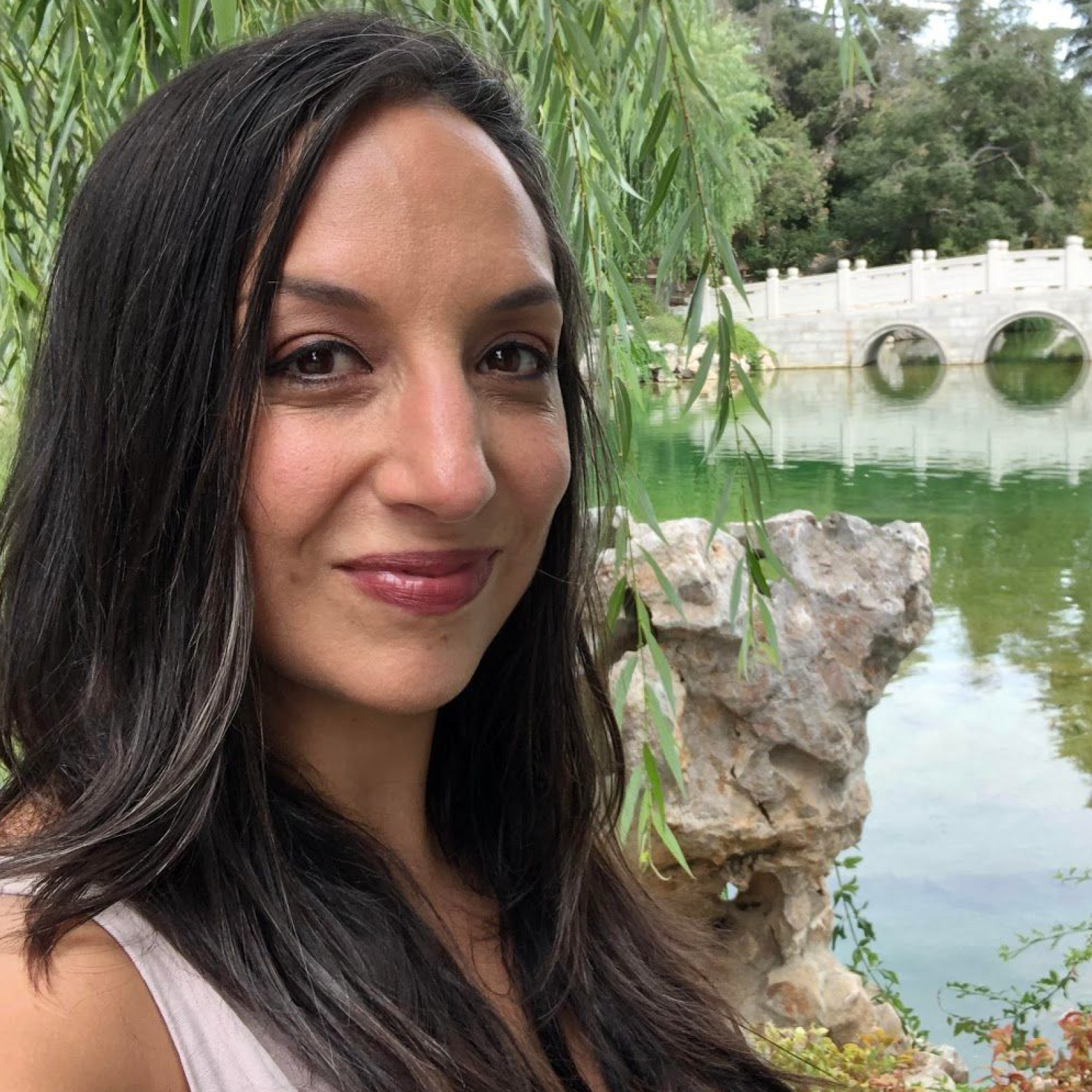By Michelle Shireen Muri, Freedom Conspiracy Principal and CCF co-chair
I’ve been working as a fundraiser at and with nonprofits for a while now — both in small and large teams — and what I’ve learned again and again is that my role as a fundraiser is never just to make it rain.
Fundraising is a thoughtful occupation. Usually called “development work,” it is highly relational. It involves community-building, communication, effusiveness, enthusiasm, cheerleading, optimism, authenticity, and the ability to develop and execute strategy. Development professionals perform a variety of tasks involving diplomacy with high levels of emotional intelligence — a quality I am convinced cannot be taught. Emotional labor is a core part of our work!
You know, when Vu Le and I were raising money to build up CCF as co-chairs, a foundation president (and potential CCF funder) asked us, “Why focus on fundraisers when all the power is concentrated in foundations?”
Well actually, it’s not.
Money is one form of power, but it is not the only source. What we pursue, how we pursue it, what we advocate for, and what we allow — are also all forms of power. Consider this: at any nonprofit organization, the development director is often the one that sets the tone for how this power is wielded, influencing other leaders in management, their colleagues on their board, and their staff.
We are at the center (aka ‘A love note to the empathetic diplomat’)
Hey, you beautiful development professional. I see you. I see you sitting right at the interpersonal and strategic venn-diagram-center of your stakeholder ecosystem. This graphic is where you are:

And this is why you are incredible:
Internally, dev professionals hold relationships with every major group of people with a stake in the organization including C-suite and director-level leadership. From program tensions to human resources issues to policy moves and more, you are highly attuned to what is happening inside the organization and are often privy to important (aka potentially influential!) information.
Externally, development professionals are diplomats, listening and in relationship with a variety of people and groups You know a lot about the personal lives, preferences, values, politics, and tensions of members of their community. And you happen to be great at navigating tensions between donors, community, staff, leadership, and others.
When working alongside an awkward, tone-deaf or abrasive leader, you are the empathetic softener to that craggy edge — and you are often the first one on the scene to smooth over conflicts between departments or individuals with the salve of negotiation or peacemaking.
You are often the complaint department and the therapist and the coach and the cheerleader. You are a much-needed professional conduit between our communities and foundations and corporations — and a doula of other people’s emotional shit around money.
And in the middle of all that, you hold your enthusiasm for your organization’s mission so close to your heart and can channel the passion of program staff and community like a supernova care-bear beam into any conversation.
You are fucking amazing!
And guess what? You can use all that charm, skill, strategy, and positioning to set the tone for what is acceptable and unacceptable behavior from funders as well as from our board and from our colleagues.
We have the power to shape narratives!
Don’t lose what makes us great
Though by nature development professionals are optimistic, pro-active leaders, I’ve heard many-a-dev-person come to talk about their work in disempowering ways. What they are facing often sounds like ocean currents, pulling them in and out of situations they feel oppressed by, feel uncomfortable with, or feel are unethical. I’ve seen people who are usually powerful, actualized, and optimistic become helpless, sad, and resigned. Many of us quit.
Many of us forget that we have the power to set the tone among colleagues, to shape narratives and to draw boundaries.
I believe that some of the currents of resignation from typically optimistic and energetic people are actually characteristics of white supremacy culture. Primary among them is our tendency to chase perfectionism, the fear that making one mistake could actually be confused with being a mistake.
White supremacy culture tells us that being honest and transparent — by voicing our mistake, a tension, or a conflict — could mean punishment or banishment.
White supremacy culture teaches us to be overly cautious and ‘inoffensive,’ and that has us spending time and energy trying to make sure that people’s feelings aren’t getting hurt by the truths that we secretly want to share. Fear of open conflict suppresses us. Defensiveness suppresses us. Thinking in the binary doesn’t help us, because there are often more than two options! Solutions and problem-solving aren’t either/or. When we look at things in a binary way, we may lose sight of complexity and more importantly, humanity.
I’ve seen a whole department leave because of an executive director’s unwillingness to excuse a salacious wealthy board member who was sexually harassing staff. I’ve seen development directors and executive directors fall into the depths of grief and sadness because foundations have made too many demands that they feel unable to speak up against #crappyfundingpractices. I’ve seen loads of resources spent on terrible ideas created by board members, major donors, or staff members that a dev professional or executive director was afraid to have conflict with. I’ve been in these positions myself.
These characteristics of white supremacy culture do not serve our community. And when we know better, we must do better, and that means that we must take it upon ourselves to recognize that we are powerful, and we must wield our power to interrupt the dynamics that disempower us and keep us from doing our best work for our organizations!
Interrogation (aka ‘We are a different kind of gatekeeper’)
Interrogating the mechanisms we are participating in will ultimately bring an end goal of creating transparent relationships based on strong values of equity and social justice, centering the needs of our communities. (Basically, community-centric fundraising!)
No longer will we let foundations set the requirement bar to levels that are impractical and out of touch. It shouldn’t require days to write an application. We shouldn’t have to leave our clients in a lurch because we prioritized what is essentially a lottery for a fraction of a foundation’s 5% pocket change. We must let foundations know that what they are asking of us is a burden, and we must challenge their arrogance when they respond with anything but what is reasonable and workable. We must also demand that foundations significantly increase their common annual payout of 5%. That payout is atrocious, and hoarding must be reformed. As @NTENorg stated “When is the [rain cloud emoji] day foundations are waiting for to open the vaults? Asking for a sector.”
No longer will we allow racism to fester in our organizations because we are afraid to be honest about it, because we are afraid that our reputations or our organizations’ chances of raising money will be damaged. This prevalent fear is based in white supremacy culture — promoting this erroneous idea that we are incapable of working out tension, of being forgiven, or that we are unable to heal.
No longer will we allow donors who sexually harass us anywhere near our organizations. No longer will we pursue gifts from foundations, corporations, or individuals that were made from exploitative practices that hurt our communities (unless there is an honest dialogue and reconciliation involving repair with those communities; start with “Decolonizing Wealth,” by Edgar Villanueva).
No longer will we allow major donors to dictate what programs we are building. We must interrogate who our organizations are actually serving — and whether that service is provided because the community requested it (whether it is a true community need) — or whether that service is provided because someone with money thought it was a great idea and paid for it.
Where we are going
We have to look at this big change as inevitable — it is just the place that we must go. And the time is now.
We must change the way we serve and the way we think we are loving and protecting our organizations when we are actually complicit in holding up white supremacy.
We must develop an analysis and draw strength from it. And we must recognize our power and — and wield it.

Michelle Shireen Muri
Michelle Shireen Muri (she/her) is the co-chair for Community-Centric Fundraising and the host of the new podcast, The Ethical Rainmaker, launching July 29. She is the founder of Freedom Conspiracy, a small collective of fundraising consultants focused on bringing values-aligned practices to clients in the nonprofit and philanthropy spaces. She can be reached at @freedomconspiracy on Instagram.

I agree with many of the points you bring up especially concerning where fundraisers are located within an organization and that unique power to bring things together. And I’m having trouble with the idea of all fundraisers being grouped together when it comes to having tough conversations with their organizations and donors. These are complicated topics with the risks being more pronounced for some than others. Is the fundraiser the ideal person, or an ED (assuming that they’re different)? How does the conversation change for white, cis-men, in the profession versus those who are more visibly coming from a marginalized identity? Are fundraisers really viewed as ambassadors by donors or closer to couriers? Looking forward to the conversation later today to hopefully discuss this nuance and more!